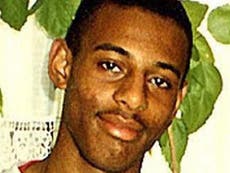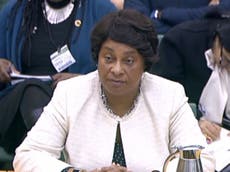Four police officers could be prosecuted over alleged misconduct in Stephen Lawrence murder investigation
Crown Prosecution Service considering misconduct in public office charges
Four police officers could be prosecuted over alleged misconduct during the investigation into the racist murder of black teenager Stephen Lawrence.
The Independent Office for Police Conduct (IOPC) has passed a file of evidence to prosecutors to consider charges of misconduct in public office.
The former Metropolitan Police officers, who have not been officially named, were in senior roles during the first few weeks of the 1993 murder investigation.
Stephen, 18, was stabbed to death during an unprovoked racist attack, and only two of at least five men suspected of involvement have been jailed for murder.
Since 2015, the National Crime Agency (NCA) has been investigating alleged corruption in the original investigation, which ended without a successful prosecution.
“Following thorough and careful analysis of the evidence, we have decided there is an indication that four former officers may have committed the offence of misconduct in public office in relation to their actions and omissions prior to the arrests of the five key suspects for Stephen’s murder in 1993,” said IOPC regional director Sarah Green.
“All four former officers were in senior roles at various times during the first few weeks of the investigation.”
A fifth officer was accused of protecting one of the suspects but that investigation was closed last year because “there was no indiciation of corruption on their part in relation to the investigation of Stephen’s murder”, the IOPC said.
The NCA gathered millions of pages of information and intelligence relating to the 1993 investigation, and interviewed more than 150 people including police officers and staff, witnesses and journalists.
The probe was sparked by a 2014 review that said a former undercover Metropolitan Police officer had spied on the Lawrence family as they campaigned for justice.
The Ellison review also found there remained a number of lines of inquiry relating to allegations that officers had been corrupt.
Allegations of corruption, incompetence and discrimination in the original investigation also sparked another damning report finding institutional racism in the Metropolitan Police.
In August, it announced that “all identified lines of enquiry have been completed” and no prosecutions can currently be brought against remaining suspects.
Two of the killers, Gary Dobson and David Norris, were jailed for murder in 2012.
Two of the three remaining suspects, brothers Neil and Jamie Acourt, have since served jail time for drug dealing, while Luke Knight has remained free.
On 22 April 1993 Stephen had been waiting for a bus with his friend, Duwayne Brooks, on Well Hall Road in Eltham, southeast London.
Mr Brooks saw a group of white youths moving towards them and said he heard one call Stephen a “n*****” before they started a brutal attack.
He was forced to the ground and stabbed, managing to run more than 100 metres before collapsing and dying of his injuries.
The initial Metropolitan Police investigation identified five suspects who were arrested — Dobson, the Acourt brothers, Knight and Norris.
Acourt and Knight were charged with murder but the prosecution was discontinued in court, then a 1994 private prosecution brought by Stephen’s family against all five suspects failed.
They attended a 1997 inquest into his death but did not answer questions, and in the same year an investigation by the then Police Complaints Authority revealed there were weaknesses and lost opportunities in the original investigation, including inexplicable delays in arresting suspects.
Jack Straw ordered a public inquiry by a former High Court judge, Sir William Macpherson, which found the Metropolitan Police to be institutionally racist in 1999 and made 70 recommendations.
The report and legacy of Stephen’s death has come into renewed focus following international Black Lives Matter protests sparked by the police killing of a black man in the US.






